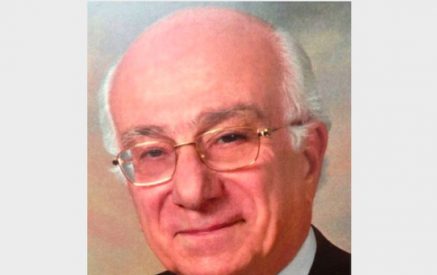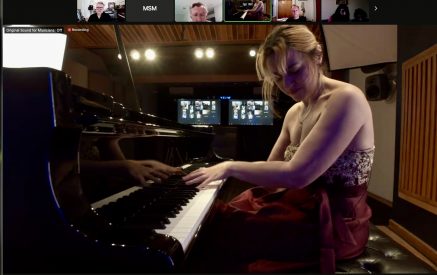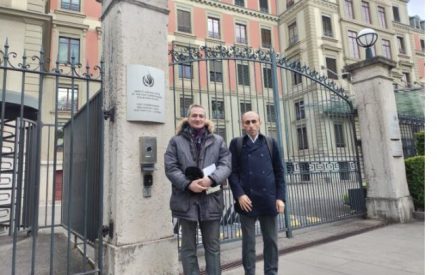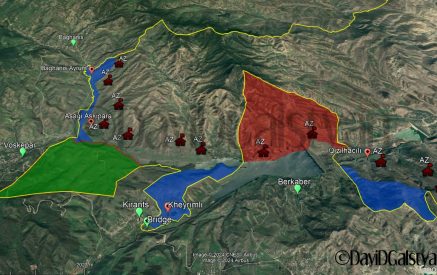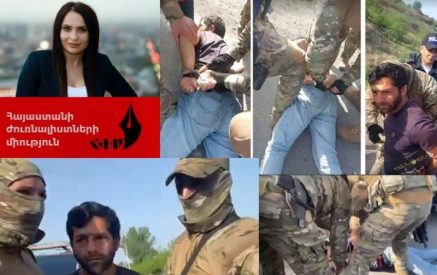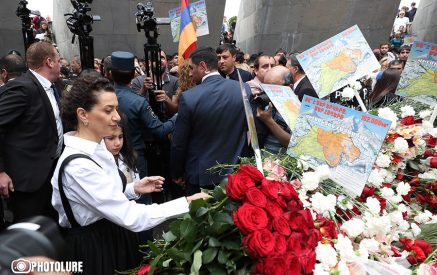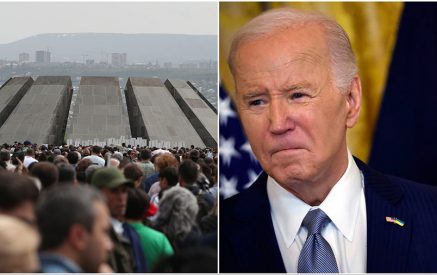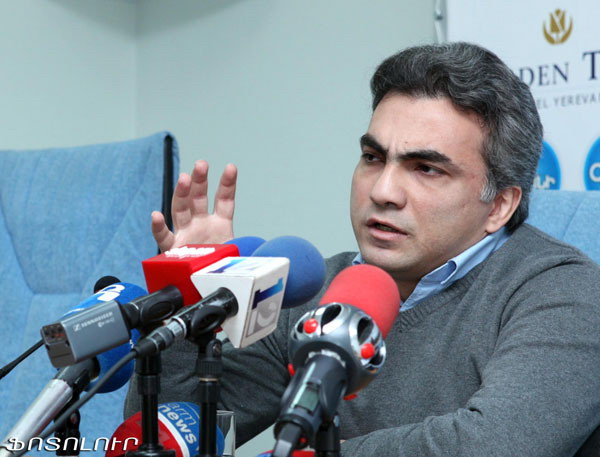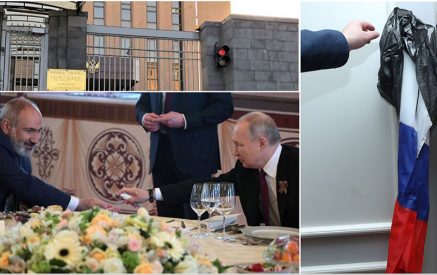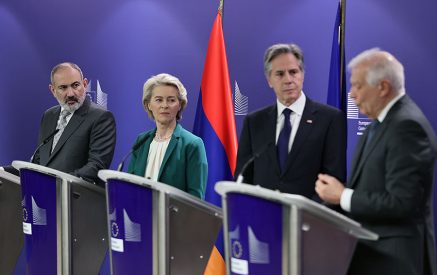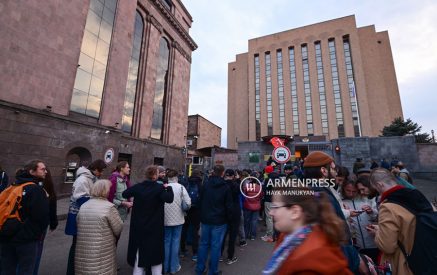According Edgar Vardanyan, Expert of Armenian center for strategic and international studies, while further expansion of relations between EU and Armenia may concern RF
– Recently, RA Deputy Foreign Minister Shavarsh Kocharyan, in a conversation with the correspondent of commonspace.eu Joseph Urso, said,- “The Customs Union is an obstacle to the signing of the Association Agreement.” Persistence is observed by the authorities to go to the end and sign up the Association Agreement with the EU. Rather sharp statements, remarks, “bites” are heard by Russian experts, the former Ambassador regarding this subject, what do you think, Mr. Vardanyan, can criticism and psychological stress have a negative impact on the decision?
– To tell the truth, I still have not seen any convincing analysis, where will prove that what Armenia is going to sign in Vilnius, is incompatible with the interests of Russia. I do not think that this level of relations with Europe, which will be approved in the nearest future between the EU and Armenia, in no way affects the RF. Meanwhile, the further enhancement of relations between the EU and RA can be disturbing for RF. In some cases, nervous comments of Russian experts have more preventive role. That is why, RA authorities, without any problem, state that they are ready to sign. There is a certain degree of uncertainty with regard to the Customs Union, and being based on different interpretations, it seems that nowadays there is the following tendency that some special relations should be established with the Customs Union, that is, there are no talks about full membership. Therefore, RA officials state that the Customs Union is contrary to the Association Agreement.
And whether the psychological pressures will continue, it depends on what developments will take place in the region, and in the international relations. Those psychological pressures take into account all these developments, that is, they are applied to have an impact on certain developments. And that such-and-such conditions are associated with significant changes occurring in the wider field. Will such changes occur, for example, will RF be much stronger, or will the West appear in the political crisis, in that case it is possible that those pressures will have impact. Those psychological pressures, I think, are made for longer-term purposes, because I do not see any problems in the short-term, official Moscow is not concerned about nowadays level of the RA-EU relations.
Read also
– Last week, RF President Vladimir Putin’s working visit to Azerbaijan was held. Various options are stated as objectives of the visit: purely economic, focused on enhancement of relations, or applying psychological pressure against Armenia. How would you assess the visit?
– The visit, of course, to a certain extent, as a fact of secondary importance, contained an element of psychological pressure. But it was not the primary message. RF is trying to strengthen its positions in the South Caucasus.
Since the office of the Prime Minister Ivanishvili in Georgia, an anti-Russian policy is not maintained by Georgia, which is beneficial to RF, and RF seeks to deepen its small presence in Georgia trying to improve the relations. RF has no problems with Armenia, Armenia is the most confidence inspiring country in the region, which is very much dependent on Moscow. Recently, Azerbaijan was the cause some problems with its often pro-Western policy. Now RF is trying at least to act so that this pro-Western does not turn to anti-Russian. Putin’s visit was also favorable for Azerbaijan, Azerbaijan is enhancing its relations with RF. But this visit did not pursue the goal that Azerbaijan becomes RF’s exclusive political partner. This visit was beneficial bilaterally, but I would not say that the parties had great achievements, but, on the other hand, it could not be considered purely a protocol visit.
– On September 29, NA majoritarian elections were held in number 38 precinct, only “Heritage” party from the opposition nominated a candidate, the other main parties did not participate in the elections reasoning the atmosphere still existing in Syunik marz, and again election frauds made by the authorities. How is this inactivity justified?
– Generally, participating in the elections in such a situation makes sense when the opposition previously could provide a high level of self-organization inside, and if it is available, participating makes sense, actions are conducted with the public, PR is exercised, it is an opportunity to appear in the society, and the elections create a field to practically test your own force. To this respect, regardless the outcome, participation in all elections really makes sense, if there is a high level of self-organization prior to the elections, and the opposition realizes what resources it possesses, and what strategy and tactics it obtains. Without it, you realize that you are going to lose, you will not have any achievement, no sense of participation.
Secondly, it is possible that organized boycott may also produce results, but the boycott should also be organized. Boycott includes campaign, and if you do not participate in the elections, it means you are conducting a non-participating campaign, and if you conduct a non-participating campaign, you simply do not take part in the elections, it also makes no sense. Boycott is a serious political and civil process, and in many cases, it is more difficult to achieve a result with boycotting than maybe winning through elections. We do not see a literate boycott in Armenia, and, therefore, boycott has become senseless in some sense. In other words, participation or non-participation in the elections, taken separately, is nothing anymore…
Passivity of political forces was due to the fact that some phase of the political activism did not record serious results due to the recent elections. All forces were in the phase of reconsidering, and revaluation of forces, and instead of political passivity, civic activism was displayed. I think the opposition political forces will become active in the fall, the main opposition forces have already applied to become active. The fall should be hot.
– Mr. Vardanyan, civil struggle began against the transport fare price rises with continuous protects in front of the City Hall. Some do not cast doubt on sincerity of that struggle, some state that it is a process controlled by the authorities. What is your opinion?
– A particular layer is shaped in the society, it can be called a layer of civic mature, active citizens, which already has some local victories behind unlike the political forces of the opposition who set more global issues before them, but were unable to solve them. On the other hand, the passivity in the political system, after the post-election phase, created a fertile ground for political activism, and public transport fare increase was a convenient excuse, and not a reason. It was an issue that everyone was concerned, the decision was strongly suspicious, and conducting activities against that decision was technically more feasible and more efficient. It promoted to record a success, everyone realized that they can do it just paying 150 drams.
Emma GABRIELYAN

